
How can heat pumps benefit your organisation?
Speak to one of our experts today
The world runs on energy. It's the driving force behind our economy, our environment, and our everyday lives. But most of us don't know that we still depend on oil, coal, and gas for our energy needs. Today, more than 80% of the energy used worldwide comes from these sources. Given an increased focus on sustainability, companies are starting to choose cleaner alternatives.
Electrification is a promising and feasible solution for decarbonising heat. When combined with clean energy, it provides a real opportunity for achieving low- or zero-carbon heating. As the only technology capable of generating a thermal efficiency of around 300–500%, heat pumps are particularly well suited to turning electricity into heat, ultimately reducing overall costs while simultaneously decreasing emissions.
Keep up with the latest industry news

Heat Pumps or Boilers?
The EU has already committed to reducing greenhouse gas emissions by 40 percent by 2030, and is proposing to increase this to 55 percent by 2050. Heat pumps play a significant role in the process. The electrification of heat through the use of renewable sources is a key technology for cutting carbon emissions in industry as well as creating smart, sustainable cities.
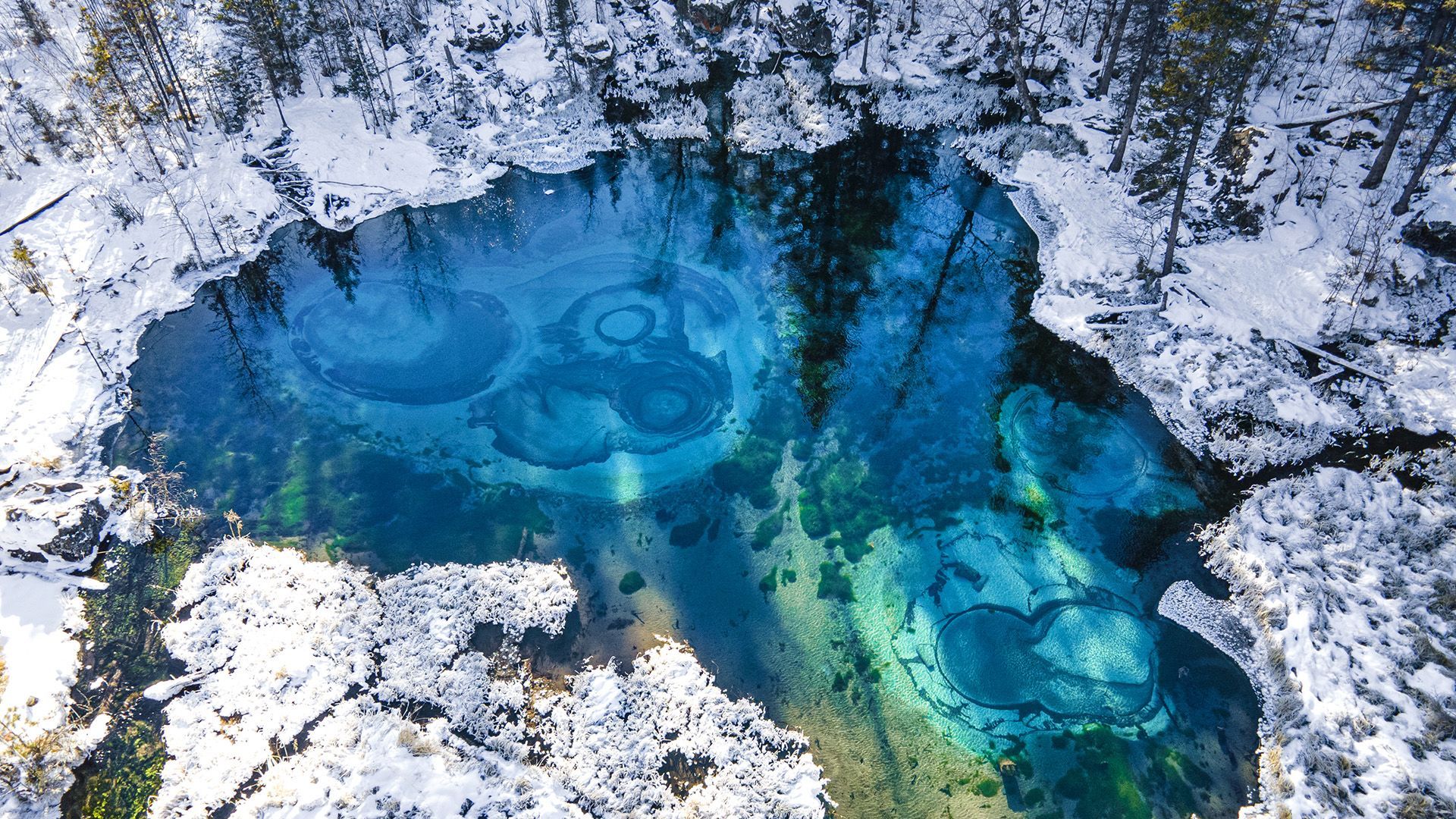
Adopting low-Global Warming Potential (GWP) Refrigerants
To run sustainable operations, businesses must reduce greenhouse gases. As recent focus has been placed on carbon emissions, managing refrigerants with high global warming potential remains a challenge. Hydrofluorocarbons (HFCs) and F-gases are under increasing pressure due to high carbon dioxide emissions. A continued focus needs to be placed on finding alternatives to HFC gases with low global warming potential.

Commercial and Industrial Spaces: Warming up to Heat Pumps
Absorption chillers and heat pumps transfer energy from waste heat sources to deliver de-carbonised cooling and heating for commercial, industrial, district energy, and even marine applications. Absorption chillers and heat pumps have been around since the 1960s, with hundreds of thousands of installations successfully operating all over the world.
Powering Sustainability for Industries and Utilities
The Paris Agreement, aiming to avoid global temperature increases beyond 1.5°C, has changed the energy landscape. Asset owners are now facing the challenge of reducing their environmental impact while ensuring their energy supply is reliable, affordable, and clean. As a first step, they must determine how they can achieve their sustainability and decarbonisation objectives by 2030.
Heat pumps are becoming increasingly relevant as we look for ways to reduce our energy demand and reach carbon neutrality. More than four-fifths of global space and water heating demand could be met by using heat pumps instead of condensing gas boilers—and that's just one example of how heat pumps can contribute directly to the phase-out of fossil fuels in the energy system. They also contribute to the phase-out of air pollutants such as particulates, SOx, and NOx.
With heat pumps, one company's waste heat can be used by another—a circular solution that leverages electricity to boost ambient heat or waste heat. With this technology, you can reduce your environmental impact while also saving money on heating costs.
Our large, industrial heat pumps have an output between 5,000 and 28,000 kilowatts; heat can be used in buildings and water, as well as for industrial processes.
Industrial heat pumps can reach temperatures of up to 95 degrees Celsius; special high-temperature heat pumps can reach 165 degrees.
Compared with low-cost units, industrial units generally have a longer life expectancy and are more efficient.
A lake is used as a source of free cooling for the nearby Northern Aalborg University Hospital and covers 80% of their cooling needs. Discover how we achieved this by reading our story.
Industry
Process industries can save energy, emissions, and costs with large heat pumps
Many industrial sectors rely on heating and cooling to run their operations. A wide range of industries use process heat and cooling, from food and pharmaceutical manufacturing to paper, distribution, and storage. The challenge is how to move these facilities from being carbon-intensive to carbon-neutral operations.
Heat electrification offers industry a key opportunity to become more sustainable and resilient. According to the IEA, industrial heat makes up two-thirds of industrial energy demand and almost one-fifth of global energy consumption.
Heat pumps are beneficial to the environment and can be utilised by many industries. They can also be used to generate revenue by selling excess heat to other companies that need it. Heat pumps are easily scalable and have excellent efficiency, especially when used to reduce carbon emissions in an industry.
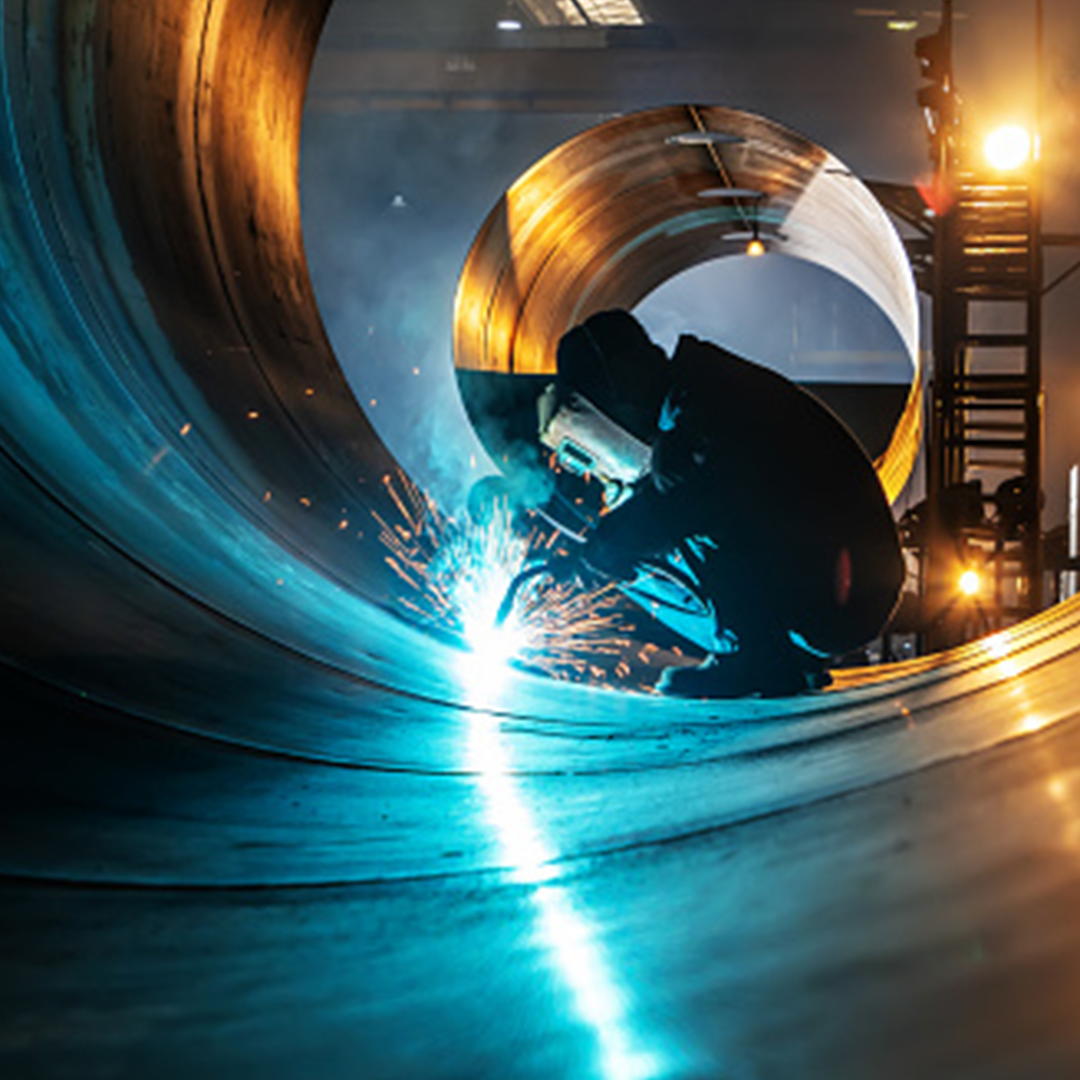

Utilities
Utilities can become more sustainable and resilient with heat pump solutions for district heating and cooling
Green district heating and cooling networks are key to ensuring a climate-neutral heat and cold supply. Because cities and densely populated areas produce a lot of energy, connecting to increasingly climate-neutral district energy is the most effective solution for moving away from coal, oil, and gas.
Experts see large-scale heat pumps as the best way to supply cities with cheaper, more sustainable, and climate-friendly thermal energy.
They are a promising solution to the energy problem. With their capability to supply both heat and cold simultaneously, they are best suited to not only provide reliable heat but also meet the increasing future demand for cooling in buildings and homes.
Our outcomes brochure brings to life the success stories of our customers. Showing how industries have achieved their goals and improved their competitive advantage by implementing our solutions.
Powering Sustainability With Heat Pumps for District Heating and Cooling
In the search for alternatives to fossil fuels, governments, cities, and industries have put a spotlight on heat pumps. Large heat pumps based on refrigeration technology support the sustainable electrification across Europe, the Middle East, and Africa by moving a larger share of heating and cooling from fossil fuels to renewable energy sources. With heat pumps, one company's waste heat can be used by another—a circular solution that leverages electricity to boost ambient heat or waste heat. With this technology, you can reduce your environmental impact while also saving money on heating costs.
Watch our video to learn how heat pumps are contributing to a sustainable future →

A Wide Variety of Low Carbon Heat Sources
Heat pumps are going to be part of the future. As fossil fuel reserves start to diminish and as we look to reduce our dependency on fossil fuels, heat pumps are going to be central to heating and cooling our homes, businesses, and schools—and even powering industrial processes.
Heat pumps can draw their heat from many places: hot exhaust gases from industrial plants, wastewater and data centres, renewable heat from the air, lakes, and rivers, even deep geothermal sources, and many more. They use locally-available heat sources at very low temperatures, increasing overall energy efficiency and reliability.
Why Work With Us – Our Commitment to You
We have an unrivalled heritage and a global portfolio of proven solutions for heating and cooling. For more than a century, we have been designing, manufacturing, installing, and servicing technologies for customers operating in sectors ranging from buildings to industries such as food and beverage and utilities.
But today, our focus extends beyond the delivery and maintenance of these assets. Addressing the need for sustainability and resilience in our customers’ installations is now at the heart of everything we do. We provide energy companies and industry with reliable, high-quality, and affordable heating and cooling solutions that contribute to the global need for more sustainable energy.
Our goal is to be a one-stop shop for owners of industrial facilities, commercial buildings, and municipal energy companies on their sustainability journeys. Our team of experts can advise, design, finance, and deliver tailored solutions.
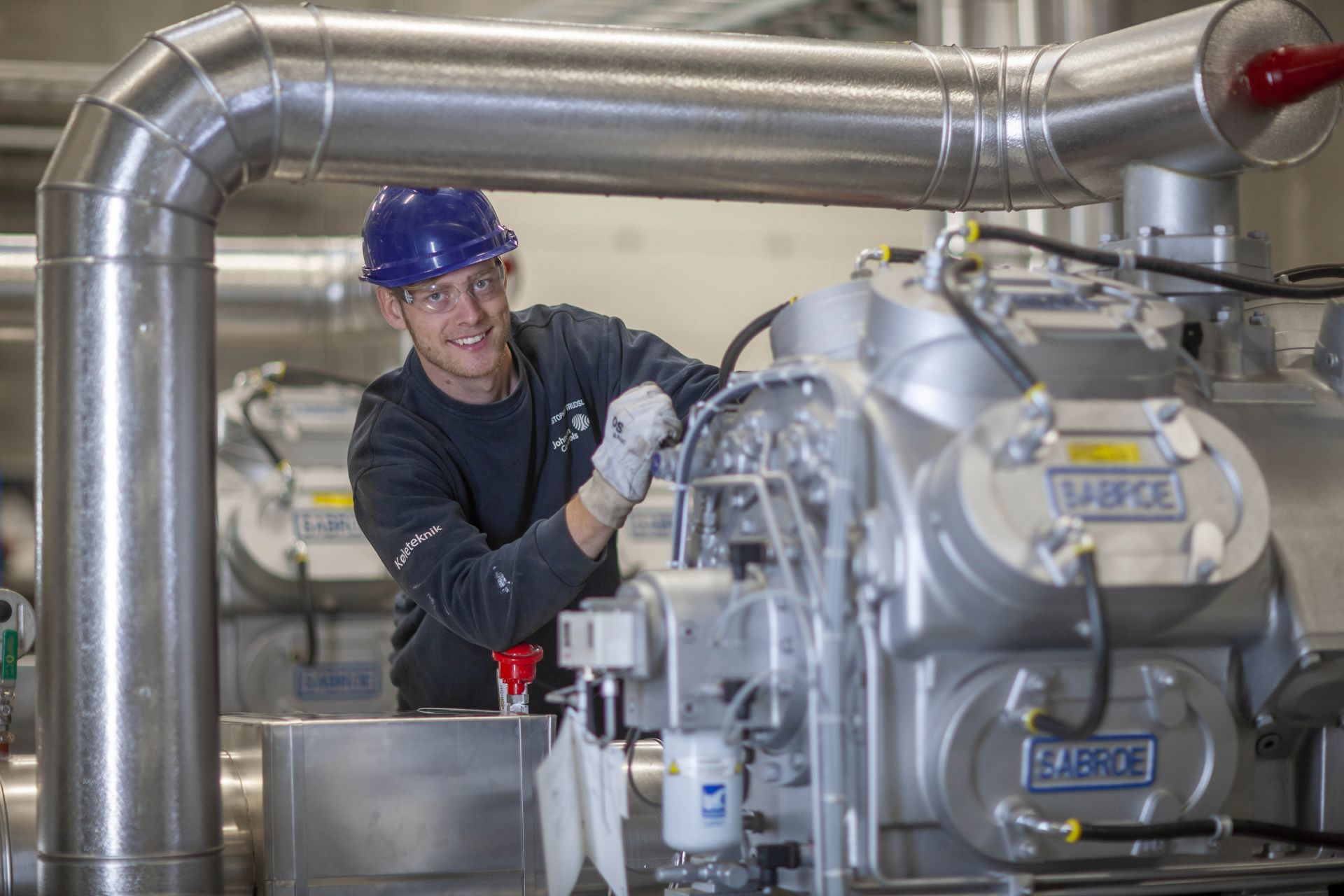
Optimise the performance of your installation and adapt it to changing market conditions
- COP between 1.7 and 8.5 in a single unit configuration
- Hot side as high as 95°C
- Capacity up to 28000 kW at max temperature
- Digital solutions for production: optimisation and efficiency gains
- Uptime reliability >96%
- 100% tested: all equipment is tested on a test bench at our factory - performance capacity and performance guarantee
- Highest quality of primary products
- Minimum 25 years support on obsolete equipment
- 24 hours delivery on spare parts
Reduce your installation and operating costs and compete successfully in the marketplace
- Long service intervals for low maintenance request
- Highest net present value
- Full lifecycle solutions for peace of mind
- Extensive flexibility in load and temperature
- Operational flexibility with other sources/technologies of heat
- Fast cut-in/cut-out for electrical grid stabilisation
- Choice of the most suitable configuration adapted to your needs
- Compact design (from 1000 mm wide) to save space
- Service flexibility: from annual fixed-price to "price/MWh - price/hour” contracts
Drive your sustainability goals and lower your environmental footprint
- Meet regulations, industry-standard practices and CSR targets
- Carbon reduction
- Water usage reduction
- Approved sustainable refrigerants with low GWP (<1)
- Highest efficiency in carbon reduction supporting electrification
With a broad portfolio and deep knowledge
of heat pumps, Johnson Controls provides reliable, high-quality
solutions for heating and cooling that use locally
available heat sources.
There are various types of heat pumps, and choosing the right one for the application depends on a number of factors. Heat pumps have different sweet spots, and health and safety considerations must be taken into account as well.
Johnson Controls has the expertise and a full portfolio of heat pumps for industrial and district heating and cooling. These include absorption heat pumps, centrifugal, reciprocating, packaged, or modular type designs. A full range of refrigerants allows us to choose any combination of heat pump and refrigerant to suit your installation and balance sustainability with economics.
Sabroe Heat Pumps
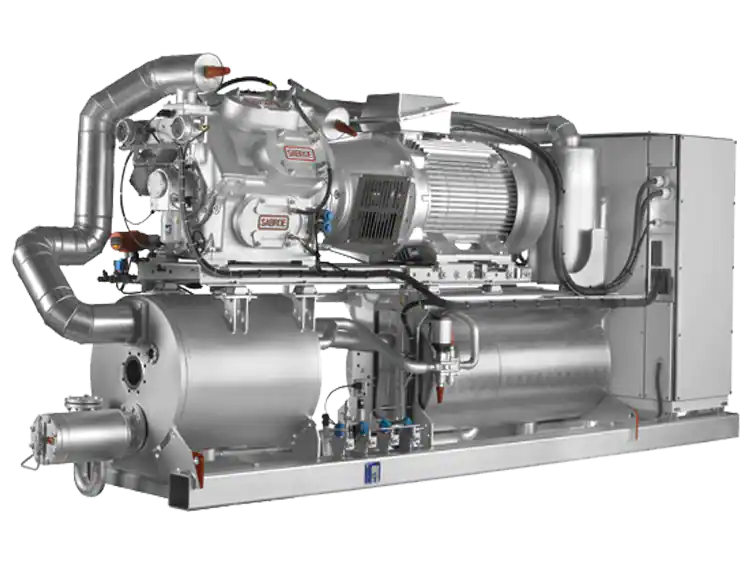
HeatPAC heat pump
A Sabroe HeatPAC unit is an extremely compact heat pump powered by the ultra-reliable Sabroe HPO/HPC/HPX high-pressure reciprocating compressor, reaching up to 40 bar differential pressure and 60 bar design pressure.
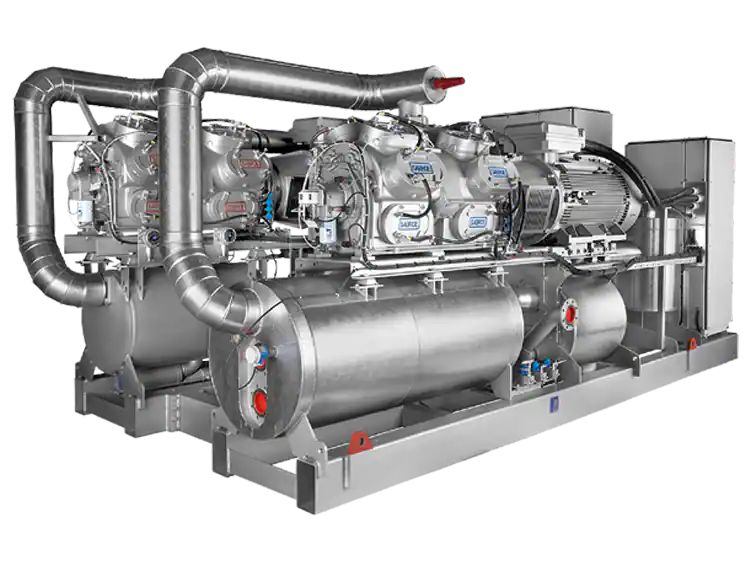
DualPAC heat pump
Sabroe DualPAC incorporates ChillPAC and HeatPAC units into one single heat pump with a modular system that allows high temperature lifts, a compact design, and attractive operating economics.
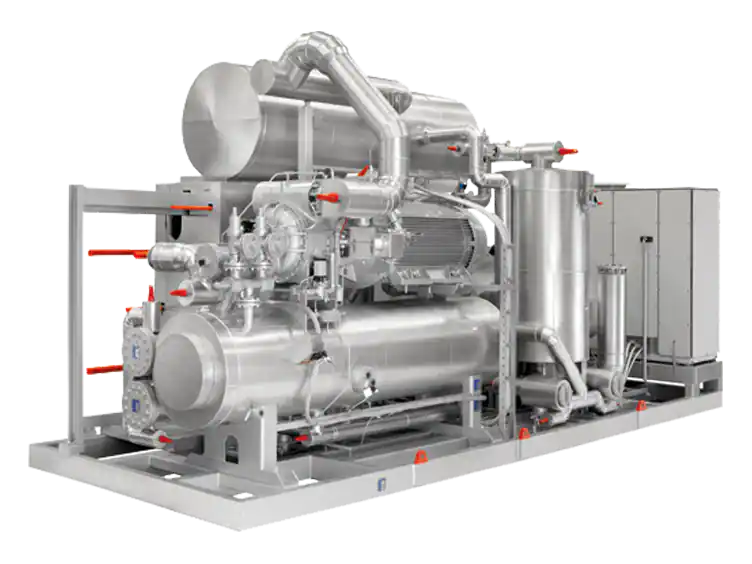
Customised heat pump
Using a screw compressor, these ammonia-based heat pumps produce high performance and excellent reliability, with capacities up to 8,000 kW.
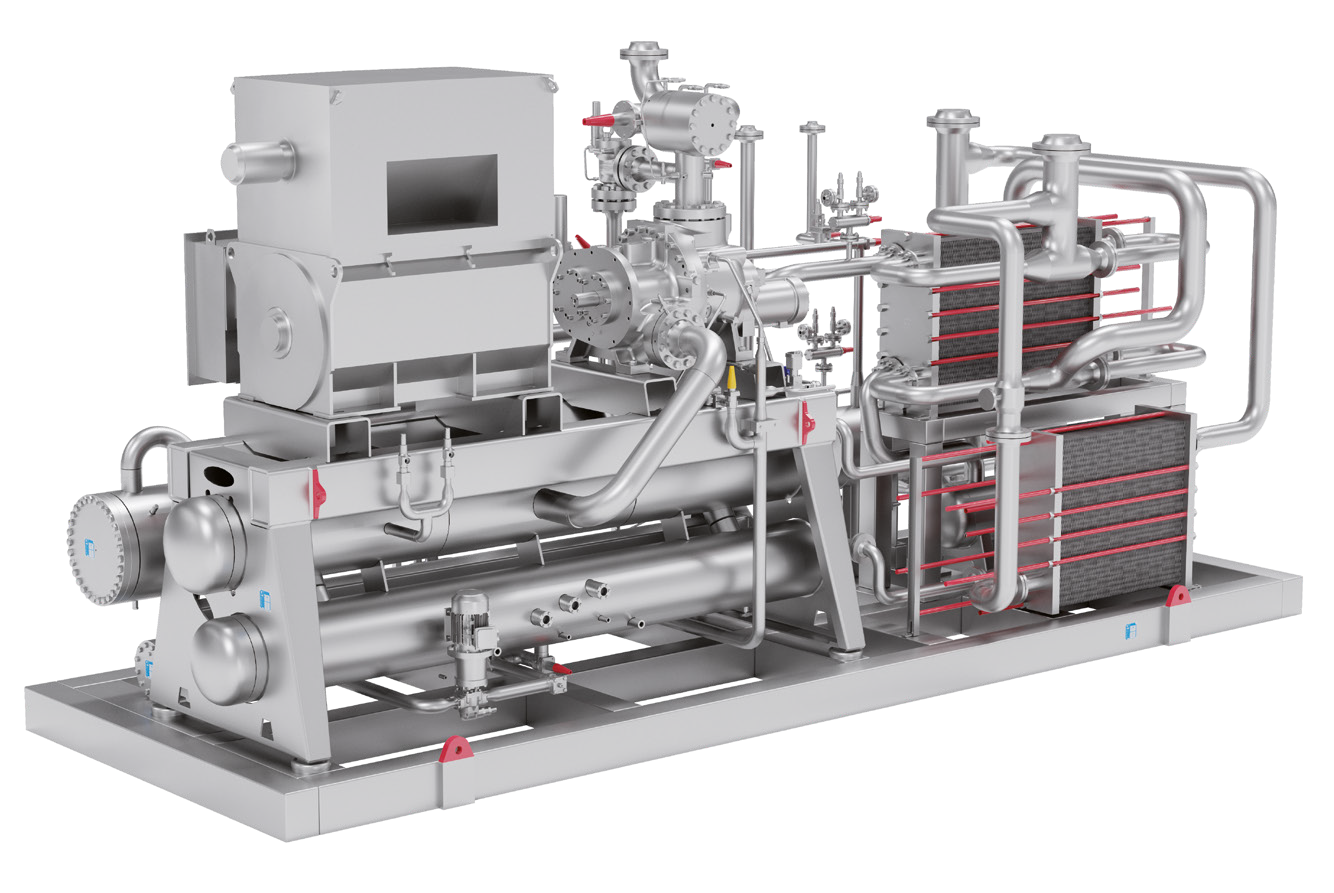
273 heat pump
Ammonia-based heat pumps use a screw compressor with capacities up to 8,000 kW, delivering up to 70°C hot water, and 7,000 kW, delivering up to 95°C hot water.
York Heat Pumps
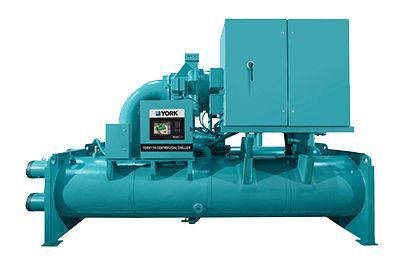
YK centrifugal heat pump
The water-cooled YK Centrifugal heat pump is designed to operate efficiently, providing flexibility, performance, and savings to any facility. With low installation, operating, and maintenance costs, it makes an excellent choice for energy-conscious businesses.
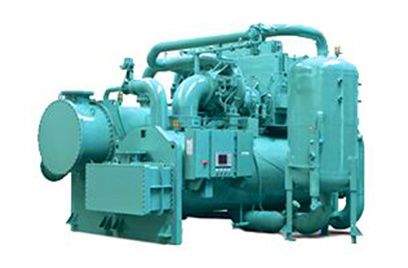
CYK compound centrifugal heat pump
The CYK compound centrifugal heat pump uses two centrifugal compressors to operate beyond the range of typical centrifugal chillers, providing reliable cooling for a variety of applications.
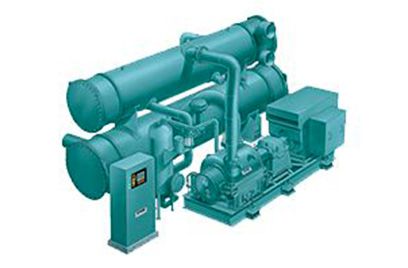
Titan™ OM custom design centrifugal heat pump
The Titan™ OM custom design centrifugal heat pump, with extraordinary capacity, flexibility, and reliability, provides water temperatures down to 0.1°F while using either electric or steam drive for water- or air-cooled condensing.
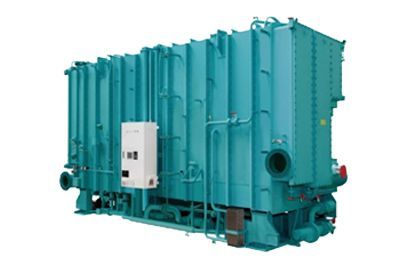
YHAP-C Absorption Heat Pump
YORK® Absorption Heat Pumps save energy, water, and CO2 by using a variety of heat sources. Ideal for district heating and industrial process heating, YORK's two-step design is more efficient than conventional models.
In order to further reduce emissions and optimise energy consumption, we provide heat pump solutions around the world that combine robust technology with cutting-edge control and digital solutions.
Watch our video to discover how we supported Stadtwerke Rosenheim's district heating project →

Contact Our Experts
In order to achieve our vision, we strive to develop sustainable energy solutions that are least harmful to humans and the environment. Therefore, we are continuously collaborating with customers, business partners, and governments to share knowledge and expertise and transfer technology through innovation sourcing and partnerships.

Morten Deding
Heat Pump Design and Engineering Director,
EMEA & LATAM
Next Steps
If you want to learn more about our solutions, you can reach out to one of our experts or fill out the contact form. We look forward to working with you to find the best solution for your needs.
Thank you.

© 2023 Johnson Controls. All Rights Reserved.

